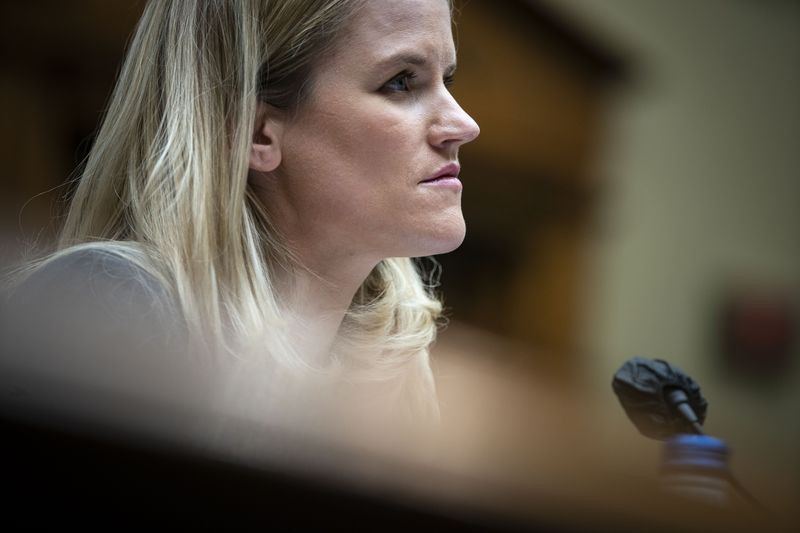
OVERVIEW
MANAGEMENT
PERFORMANCE
POSSIBILITIES
CAPITALS
ACTIVITIES
ACTORS
BURGESS
|
SOCIAL MEDIA
CONTENT MANAGEMENT Will Europe’s ‘Gold Standard’ Clean Up Social Media? 
Frances Haugen ... Photographer: Al Drago/Bloomberg Original article: https://www.bloomberg.com/news/articles/2022-04-22/will-europe-s-gold-standard-clean-up-social-media-quicktake Burgess COMMENTARY Getting meaningful regulatory oversight of social media is long overdue ... and a huge amount of social damage has already taken place and cannot easily be reversed. The dominant metric for performance in the social media sector has been revenue growth and profits with little attention on the massive social damage that is going on. A perfect solution to the complex problem of effective regulation does not exist, but something a lot better than the prevailing 'anything goes' is possible, and hopefully this is what is being developed in the EU right now. Peter Burgess | ||
|
Will Europe’s ‘Gold Standard’ Clean Up Social Media?
Written by Jillian Deutsch ... @DeutschJill April 21, 2022, 11:00 PM EDT For all the promises from politicians to tackle online hate speech and misinformation, they continue to proliferate. Governments know they can polarize societies and harm the vulnerable, but fear a broad crackdown will see them accused of censorship. After more than a year of internal wrangling, the European Union is readying legislation that, according to Facebook whistle-blower Frances Haugen, could represent a “global gold standard” for regulating social media. Previous frustrated efforts to control the world’s technology giants suggest the hardest work is still to come. 1. What’s driving this? We’ve come a long way since the early days when social media were supposed to connect the world and promote truth and mutual understanding. Today, conspiracy theories about U.S.-funded biolabs in Ukraine can leap from obscure QAnon forums all the way to Fox News. We’ve seen scandals over personal data breaches and the promotion of quack treatments for Covid-19. Events like the Jan. 6, 2021 Capitol Hill riot show how misinformation can trigger violence. Allegations last year that content on Facebook encouraged eating disorders and helped to foment genocide in Myanmar increased the pressure for action. 2. What’s the EU’s plan? The bloc’s Digital Services Act is set to give governments more power to force the companies to take down illegal content such as hate speech, terrorist propaganda or ads for unsafe toys. If they don’t, they could face fines running to 6% of their annual revenue. Platforms would have to adhere to a code of conduct, allow enforcement agencies to examine the algorithms that decide what users see and report back on how they’re dealing with harmful material. If it’s found they’re not doing enough, they could be told to alter the algorithms. Additional powers to combat disinformation could be triggered during a crisis such as a war or a pandemic. Ads aimed at children -- an important source of revenue for the companies that own Facebook and Google -- would be banned. So would the targeting of ads using race, religion and other sensitive information. 3. How big is this? It means the social media giants will no longer be left to police themselves, though much depends on what the EU decides is harmful and how rigorously the new rules are enforced. A lot of “fake news” and the misinformation flagged by Haugen isn’t illegal and can’t be taken down unless it violates the platforms’ terms and conditions. The alternative is to stop objectionable content appearing in feeds. But the algorithms that decide what users see are complex, and there’s little precedent to guide the EU’s researchers when they start their work. 4. How have the big tech firms responded? They’re concerned that the details of how the DSA will work in practice aren’t clear. Watchdog groups say the tech giants have spent record sums lobbying the EU, especially on the DSA and the Digital Markets Act, a separate piece of legislation that’s designed to rein in their market power. The DMA was originally their main focus, as Apple Inc. would be forced to allow third-party app stores in its products and Amazon.com Inc. would be banned from ranking its own e-commerce products higher than those of rivals. The DSA eventually became the more contentious bill after Haugen came to the European Parliament ringing alarm bells over hate speech and harmful content and lawmakers sought to ban targeted advertising altogether. While that effort has failed, the companies have continued one of the biggest lobbying efforts Brussels has ever seen. 5. What could go wrong? The EU will need to find the funds to employ hundreds of people to monitor the DSA and the DMA. And even heavy fines might simply be shrugged off by the cash-rich tech giants. National regulators have never come close to applying the maximum fines allowed in the EU’s current data rules. There are also technical obstacles. For example, how do you know that someone is too young to be targeted with ads without collecting data on them in the first place? The way the DSA is implemented will be up to the EU’s 27 member states, which all have different legal regimes. Their varying interpretations of what represents illegal hate speech could mean a post is be taken down in Germany but left up in Denmark. 6. Is the EU leading the way here? The DSA will still put Europe ahead of the U.S. in regulating big tech companies. The U.S. even fought the EU’s plans, arguing they unfairly target American companies. But plenty of Washington lawmakers have been pushing for tougher action and see the DSA as a possible model. The U.K. may end up being even tougher than the EU in tackling harmful content. Its planned Online Safety Bill would impose bigger fines and could even mean jail time for executives who fail to comply. The Reference Shelf
Read More: Tech Companies Face Billions in Fines Under EU Content Rules
| The text being discussed is available at | https://www.bloomberg.com/news/articles/2022-04-22/will-europe-s-gold-standard-clean-up-social-media-quicktake and |